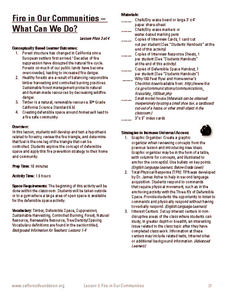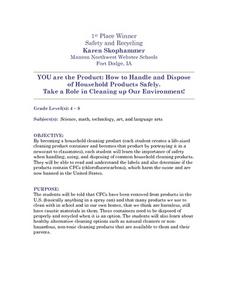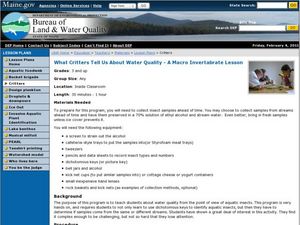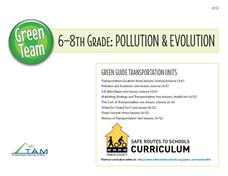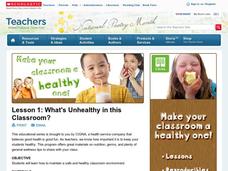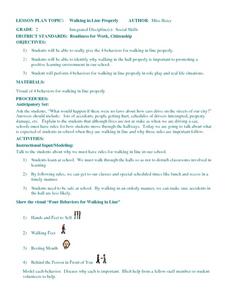Clean Up Australia
Why are Batteries Harmful to the Environment?
Open this lesson plan by reading together about primary and secondary batteries (such as nickel-cadmium cells), problems they can cause in the environment, and how humans can minimize the damage. Afterward, little ones examine a...
Pulitzer Center
Exploring Downstream: Water Resources
The lack of clean water is a life-threatening plight for millions of people around the world. Through an extensive WebQuest, young environment or social studies classes compare our water availability to that of the cxitizens of Ethiopia,...
Forest Foundation
Fire in Our Communities - What Can We Do?
Learn about defensible space and renewable resources with a lesson about forest fires. After exploring the ways that humans have impacted the environment, kids conduct mock interviews about differing points of view in the conservation...
Curated OER
The Risk-Benefit Factor Challenging Our Environment
Seventh graders examine the factors that are contributing to the degrading of the Earth's environment. In groups, they analyze the types of hazards when dealing with pests and give an example of each. For each situation given, they...
Beyond Benign
Daphnia Bioassay LD50
De-icing materials may have a harmful effect on our environment; have your class perform an experiment to test the nature of these effects. Scholars monitor the survival rate of a sample of daphnia as the concentration of a de-icing...
Curated OER
Marketing to Teens: Gotta Have It! Designer & Brand Names
Advertisers want us to believe we would be accepted if we wore the right clothes or owned the right stuff. This assumption forms the heart of an exploration of the impact of advertising on teenagers. A safe classroom environment would...
Curated OER
The Consequences of Our Consumer Behavior - Toys And Games
Students examine how consumer information can protect consumers from unsafe products. They identify popular games and toys, discuss labelling, role-play sharing and playing safely with toys, and plan and design their own safety...
Rainforest Alliance
Who Takes Care of the Maya Forest Corridor?
Who keeps animals safe? Who keeps us safe? Discover the helpers that make learning and growing possible through a medley of activities that focus on habitats—ours and those in the rainforest. Scholars are asked to identify one helper who...
Pulitzer Center
The Global Water Crisis
High schoolers examine the "quiet crisis," the lack of clean water, by reading articles and viewing video clips. They discuss the situations in Ethiopia, Yemen, Kenya, and Nepal. There are two options for the lesson, but one of them...
KOG Ranger Program
Protecting Homes from Wildfires
Smoke detectors and fire extinguishers help to protect our homes from the inside. Learn about ways you can keep your home safe from the outside with a lesson about protecting houses from wildfires. It includes background information and...
Curated OER
How to Handle and Dispose of Household Products Safely
Students engage in the study of household cleaning products, how to read the labels and how to use them safely and also how to properly dispose of the containers when they are empty. They read the labels and determine if the products...
The New York Times
Crossing the Line Online: Sexual Harassment and Violence in the Age of Social Media - NYTimes.com
Sexual harassment and sexual violence are by no means new issues. What has changed is the role of social media in these issues. This powerful and troubling lesson uses a specific rape case to launch research into a discussion of the...
Curated OER
What Critters Tell Us About Water Quality: A Macroinvertebrate Lesson
Students explore our ecosystem by investigating the quality of our water. In this aquatic insect lesson, students examine a group of random insects collected from different streams and ponds in the area. Students record their...
Carnegie Mellon University
Introduction to Climate
Begin a full lesson on climate change by demonstrating how carbon dioxide gas contributes to increased temperatures. Be aware that pressure inside the antacid-containing bottle in Activity 2 may cause the lid to fly off; keep viewers at...
Desert Discovery
Leaping Lizards
Here is a fine biology lesson that introduces youngsters to reptiles. They study their feeding habits, their habitats, and the adaptations they must make to survive in their environments. The outstanding lesson includes two excellent...
Safe Routes to School
Pollution & Evolution
Bring together a study of two major scientific topics with a lesson on the relationship between pollution and evolution. With the help of a PowerPoint presentation, hands-on activity. and class demonstration young scientists learn how...
Curated OER
Moebius Strips
Students make Moebius strips and use them to demonstrate the interconnectedness of an environment. They explore the natural cycles (water, oxygen/carbon dioxide, carbon, nitrogen) within the environment. They describe how the cycles are...
Curated OER
Pollution
Young ecologists investigate some of the many ways that human activities adversely affect the environment. After identifying the main types of pollution (air, water, soil), 3rd graders fill in a Venn Diagram by pasting cut-out pictures...
Curated OER
Animal Electronic I.D.
Students discover ways to keep the animals in our environment safe by examining electronic I.D. tags. In this animal safety lesson, students participate in a role-playing activity in which they are monitored by an electronic I.D. tag. ...
Perkins School for the Blind
Cooking and Kitchen Tools
Independent living skills and skills that can be used to gain employment are very important for any learner. Teens with visual impairments explore the kitchen to understand what everything is and what it all does. The instructional...
Curated OER
Lesson 1: What's Unhealthy in this Classroom?
Students discover behaviors and practices that are unhealthy within their classroom environment. In this early childhood lesson plan, students identify behaviors and practices that lead to an unhealthy environment, and discuss how to...
Curated OER
Walking in Line Properly
Students discuss what would happen if there were no driving safety laws, orally state four behaviors for walking properly in line, identify why walking in hall properly is important to promote positive learning environment, and perform...
Curated OER
Hector's World - Heros
Students read the the story Heroes in order to navigate the Internet safely. In this Hector's World lesson, students examine the importance of checking with an adult before participating in the online environment. Students explore other...
Curated OER
How Can We Help?
Students explore ocean animals and their environments. In this environmental stewardship lesson, students read a story and discuss the environmental needs of animals. Students think of ways to help clean up the environment and to make...




